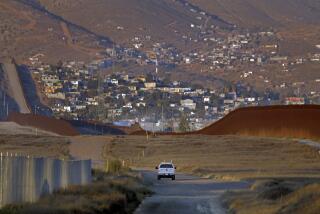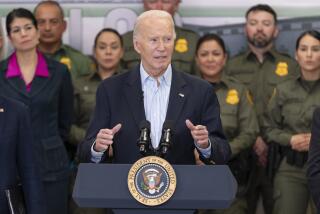Mexico protests shooting death of teen at Texas border
- Share via
Reporting from Mexico City and Washington — For the second time in less than two weeks, the death of a Mexican national at the hands of U.S. border agents is outraging Mexicans and testing relations between the two countries.
The Mexican government Wednesday vigorously protested the shooting this week of a 15-year-old boy at Mexico’s border with Texas. The boy, Sergio Hernandez Guereca, died of a wound to the face. U.S. officials say he died after a Border Patrol agent opened fire Monday night on a group of Mexicans throwing rocks at the agent, who was attempting to arrest suspected illegal immigrants.
Mexican authorities accused agents of using excessive force, while U.S. officials promised a thorough investigation of the incident.
Another Mexican national died May 29 after border agents shot him the night before with a Taser stun gun at the San Ysidro border crossing that separates San Diego from Tijuana.
Anastasio Hernandez Rojas was being deported to Tijuana when he resisted, became combative and was Tasered, authorities said. The San Diego County medical examiner’s office ruled his death a homicide and also found “acute methamphetamine intoxication.”
“We firmly repudiate and reject the violent actions by U.S. authorities in the last few days that have led to the deaths of Mexican citizens,” Mexican Foreign Minister Patricia Espinosa said Wednesday.
Referring to the latest shooting, President Felipe Calderon implored the U.S. government “to investigate fully what happened and punish those responsible.”
“The government of Mexico will use all means available to protect the rights of Mexican migrants,” Calderon said in a statement. “Mexico also rejects the use of disproportionate force by U.S. immigration authorities along the border.”
The boy’s mother said in a television interview that she doubted the U.S. version of events and quoted someone she described as a witness who said her son had raised his hands just before he was shot.
“I am sure my son did not attack them. He wasn’t like that,” Maria Guadalupe Guereca said. “His only mistake was being near the river … staying there to watch.
“My son paid for what others did,” she added, before breaking down in sobs.
The boy fell dead on the Mexican side of the dry Rio Grande that separates El Paso from Ciudad Juarez, a city ripped apart by deadly drug war violence.
Two Border Patrol agents were on the U.S. side of the riverbed, a concrete apron that forms the banks, where they were attempting to detain a group of people suspected of being smuggled into the U.S. from Mexico, said Andrea Simmons, a special agent with the FBI in El Paso, which is investigating the case.
One agent detained a Mexican national from the group. When a second agent detained a second Mexican national, other men with him “ran into Mexico and began throwing rocks at the agent,” Simmons said.
The second Border Patrol agent shouted at the men to “stop and retreat,” but they continued to pummel him with rocks, she said. He then fired his weapon “several times, striking one subject who later died.”
Simmons acknowledged that the FBI was not certain that the boy slain was among those throwing rocks.
Ramiro Cordero, a Border Patrol supervisor, said the agent who opened fire was placed on administrative leave until the shooting could be investigated. He promised a “thorough, multi-agency investigation.” The agent’s name was not released.
Simmons described the area, underneath a railroad bridge that spans the border, as a “known high-risk crime area where rocks are regularly thrown at Border Patrol agents and where other assaults have been reported.” The union representing the Border Patrol says its agents were attacked nearly 1,100 times in each of the last two years.
Hernandez Guereca’s parents said their son was not part of the group trying to sneak into the U.S. They said he had finished eating, hooked up with some friends and was watching, from the Mexican side, as the agents rounded up people who had crossed the river.
“He was a good boy, innocent,” said the father, Jesus Hernandez. “I ask for justice, not the usual thing where they say they are going to investigate but they do nothing.”
richard.serrano@latimes.com
Wilkinson reported from Mexico City and Serrano from Washington. Ken Dilanian of the Washington bureau contributed to this report.
More to Read
Sign up for Essential California
The most important California stories and recommendations in your inbox every morning.
You may occasionally receive promotional content from the Los Angeles Times.












